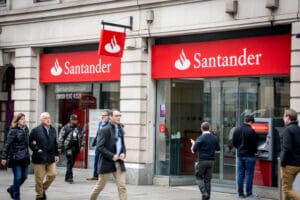Thousands of small business owners are accusing Santander of breaking its promises after the bank announced it would begin charging £9.99 a month for business accounts it had guaranteed would be “free for ever”.
The controversial move affects long-standing customers who signed up to Santander’s Free Banking Forever tariff—accounts that were marketed with a written guarantee of zero banking fees for life. Despite that pledge, affected customers have now been told they will be charged from October this year.
The decision has ignited fury among sole traders and microbusinesses who say they relied on the guarantee when choosing Santander. “Which part of ‘for ever’ do Santander think doesn’t apply now?” said a business customer since 2005 who wished to stay anonymous. “It’s not just about the money. It’s about trust—and they’ve broken it.”
Santander withdrew its free business banking offer for new customers in 2011, but existing account holders were assured their fee-free terms would continue indefinitely. The bank previously attempted to introduce fees in 2012 but was forced into a U-turn after facing threats of legal action.
Now, more than a decade later, Santander has revived the charges—this time claiming that the original guarantee no longer applies following internal mergers and account migrations.
In a statement, the bank said: “The business banking landscape has changed significantly over the last decade. As such, we are simplifying our business banking offering as the first step to ensure that we can sustainably and efficiently evolve to better meet the needs of our business customers in the future.”
It also claimed that accounts predating the 2008 merger of Abbey and Alliance & Leicester were migrated into its Business Every Day product in 2015, and that this newer account type was not covered by the “free forever” pledge.
But customers say they were never informed that their original contractual guarantees were being revoked. Jennifer Iles, a graphic designer and early adopter of the free account, said: “I objected when Santander tried to impose monthly charges in 2012. Now they’re trying again—and pretending there’s no obligation. They’ll have a fight on their hands.”
For many, the dispute is about principle rather than pounds. “If I had signed up to an account that cost £9.99 a month, that would have been my choice,” Lawrence said. “But I signed up to a bank that told me in writing that I would never have to pay fees. It was part of the deal.”
Legal experts suggest the bank could face renewed legal scrutiny if it cannot demonstrate that customers were clearly informed of the contractual change. Consumer advocates say the situation echoes wider concerns about financial institutions unilaterally shifting long-standing terms and eroding customer trust.
With Santander already under pressure to restore its reputation in the business banking sector, the decision to impose charges on its most loyal account holders may prove a costly misstep.
Read more:
Santander faces backlash over charges on ‘free forever’ business accounts



